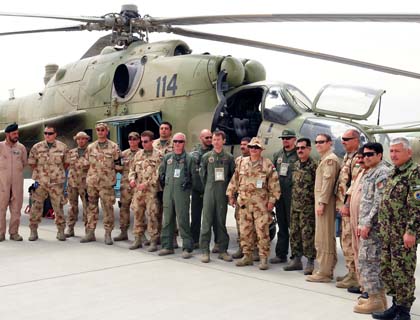WASHINGTON - Reiterating its commitment toward establishing long-term peace in the country, the UN General Assembly has urged the international community for continued support to Afghanistan during the transition phase. Unanimously adopting a resolution at the end of its annual debate on the situation in Afghanistan on Monday, the General not only expressed its commitment to achieve the goals of the Lisbon Summit, but also recognized the need for support beyond 2014.
The support should include further development, training and professionalization of Afghan forces and their capacity to counter continued threats to the country's security, the resolution said.
It condemned the high level of violence wracking Afghanistan, the assembly recognized the "continuously alarming threat" posed by the Taliban, Al Qaeda and other extremist groups and stressed the need for the Afghan government and the international community to continue working closely together to counter such acts.
The assembly said reconciliation efforts should enjoy the support of all Afghans, including civil society, minorities and women's groups, praising the government's ongoing work to forge peace through mechanisms such as the High Peace Council and the Afghan Peace and Reintegration Program.
"For Afghanistan, 2014 is not a solid endpoint set in stone," said Afghan Ambassador to the UN Zahir Tanin in his address to the General Assembly.
"Instead, it stands as a way marker for a new phase of the partnership between Afghanistan and the international community, with Afghanistan as a fully sovereign partner," he said, adding it was important to be realistic in expectations.
"We cannot simply sit back and wait in fear of failure in Afghanistan," he remarked, though there were some who preferred to do so. "Let us not insult the future … let us stick to making a successful present day," Tanin said.
Rosemary Dicarlo of the US said the Obama administration was looking forward to the Bonn meeting, which would provide the international community with an opportunity to show its commitment and long-term support for Afghanistan.
So did British Ambassador Mark Lyall Grant, looking forward to the announcement of the second set of provinces that would transfer security responsibility from ISAF to Afghan forces. Grant hoped it would lead to 50 per cent of all security being Afghan-led.
He was pleased to see that more than 2,000 delegates attended the recent Loya Jirga, and welcomed the body's inclusivity. He also praised the High Peace Council, whose work must continue in spite of recent violence, saying President Karzai was willing to engage with insurgents if they were genuinely willing to work towards a strong and stable Afghanistan.
Raza Bahir Tarar of Pakistan said Islamabad supported an Afghan-led, inclusive reconciliation process, with constructive dialogue instead of "politics distorted by mistrust, intimidation, fear or revenge". He hoped the UN, the Organization of Islamic Cooperation (OIC) and others would continue working as partners.
Regional unity was the key to deal with security and development challenges, and Afghanistan's neighbors had a special role in its stability, he said, noting greater regional connectivity initiatives, supported by Pakistan.
Introducing the resolution on the situation in Afghanistan, Peter Wittig said the core of the resolution was about linking the past decade with the next, and that endeavor would require international support.
Calling for strategic, innovative ways to create better employment perspectives and to reduce poverty, Wittig emphasized the need to provide proper training to Afghan security forces.

